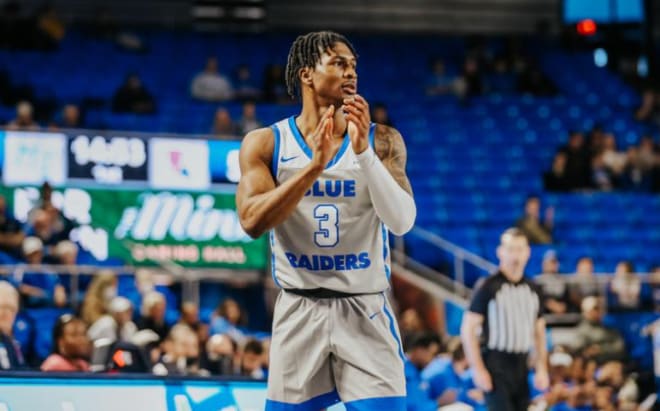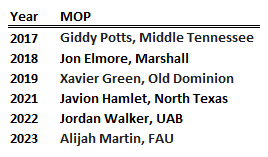Three Keys For Middle Tennessee

The 2024 season begins for Middle Tennessee tonight against the Horizon League's Northern Kentucky Norse. Last week I broke down the expectations MTSU faces this season considering where and how they've finished the past two seasons in Conference USA, as well as the myriad of changes that Conference USA has experienced since the Blue Raider men last took the court.
Here, I break down the three most important factors the Blue Raiders face in order to conquer those expectations.
3. Turnover Margin
Ball security has never been an area of strength for Middle Tennessee during the McDevitt era. The team only has one finish in the top 250 of the country in TO% in the last five years, which was 236th.
The way they have been able to mitigate that recently is simply by forcing their opponents to turn it over more than they do, finishing 68th and 24th, respectively, the past two seasons in opponent TO%. They have also fared well in the offensive rebounding department, finishing in the top third of the country in each over the same span. So even when they haven't been efficient in securing their own possessions, they are creating more possessions through multiple avenues.
All that said, if Middle Tennessee really wants to reach the next level of success, finding a way to be at least average regarding ball security would go a long way. Of the bottom 163 teams (omitting the top 250) in TO% last year, only seven had a top-100 offense, per KenPom. And of the last seven C-USA representatives in the NCAA tournament, six had a top-100 offense.
2. Road Defense
It has been well-cited how impressive MTSU has been at home the last two seasons, going 27-2 with an average margin of victory of 14 points. While protecting homecourt is important, the drop-off in road games has been too significant with an 8-20 record in away arenas over the same span.
Looking at the numbers, the offense is surprisingly very consistent both home and away, and the massive decline is on the defensive side of the ball. Staying in the range of the past two years, opponents are scoring 76 ppg in MTSU's road games, but only 60 ppg in the Murphy Center. Opponents are shooting nine more free throw attempts per game, and three more 3-point attempts per game. As you would assume, opponents are hitting those at a better rate on their respective home floor, making 6% more free throws and 7% more on 3s. Filter the data to conference play only, and opponents are shooting 10% better from 3 in Blue Raider road games.
I would imagine every team in the country's splits resembles this trend to some extent. It is no secret teams play better at home across all sports, let alone those of collegiate age. Still, one has to believe a gap this large between home and road defensive performances can be narrowed.
1. All-Conference Guard Play
College basketball is a guard's game. That might even be more the case in Conference USA.
Below is a list of C-USA Tournament MOP awards for the last six tournaments. Spoiler alert: they all played the guard position.

That 2017 MTSU team was the last team to win the C-USA tournament that didn't have a first-team all-conference guard (Giddy finished third team)
Last season's first all-conference team featured five players labeled as a guard. 2019 through 2022 only featured one forward or center per year on each of the first all-conference teams.
You probably get the point by now. Guards are important, especially in this conference. There is no coincidence that Coach McDevitt's best season in Murfreesboro featured his only second-team all-CUSA guard: Josh Jefferson. It is essential the Blue Raiders get that kind of production out of at least one of its backcourt members. Cam Weston and Jestin Porter have the clearest paths.
Weston regressed with his efficiency last season after a strong first year in Murfreesboro as the sixth man. In 2021-2022, he displayed an incredible touch around the rim, finishing 15th in the country in 2P% (60%) among all players with at least 500 minutes who stood 6'3 or shorter, per Bart Torvik. Weston is a creative and confident playmaker both when looking to score and to pass. He can play like a loose cannon at times, but that high level of confidence is a big part of what makes his potential so high. Without it, he doesn't sink the game-winning stepback 3 in the C-USA tournament quarterfinals eight months ago.
Jestin Porter exited the JuCo level with solid volume scoring experience, averaging 19 ppg over 40 games at Tyler JC. Last year started strong as he scored 14 or more in four of his first eight games. He then hit a proverbial wall of some sort, only scoring 4 points or less in 17 of his final 25 games. There is chatter around the program that the junior guard has taken a noticeable leap over the offseason. Also worth noting is that he started both scrimmages on the team's foreign tour to Italy this past summer.
Per CBB Analytics, the two only coexisted on the court for a total of 85 minutes last year. As that number should dramatically increase, so should the poise and efficiency of each player individually. Hopefully, it will be enough to make them one of Conference USA's best backcourts.